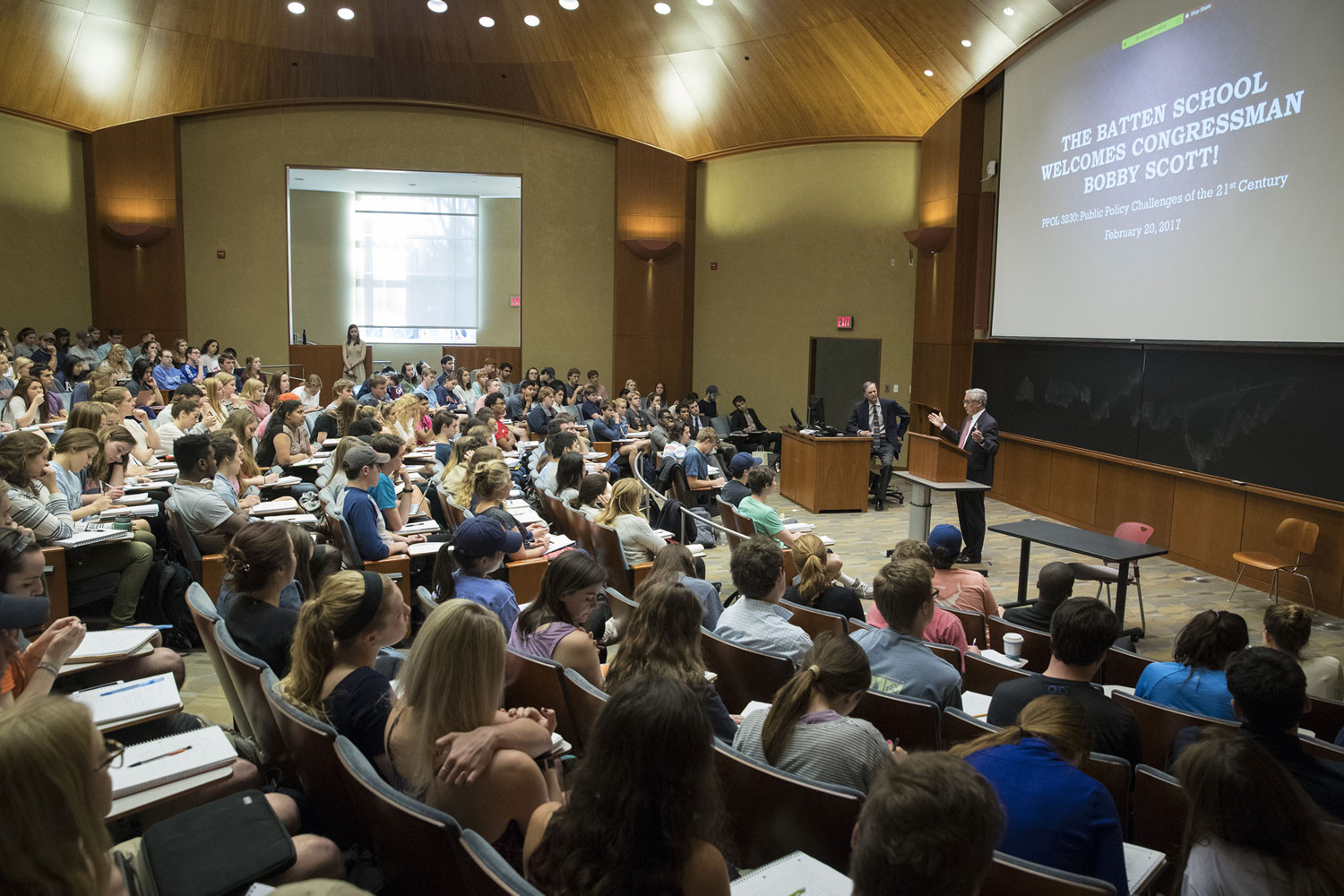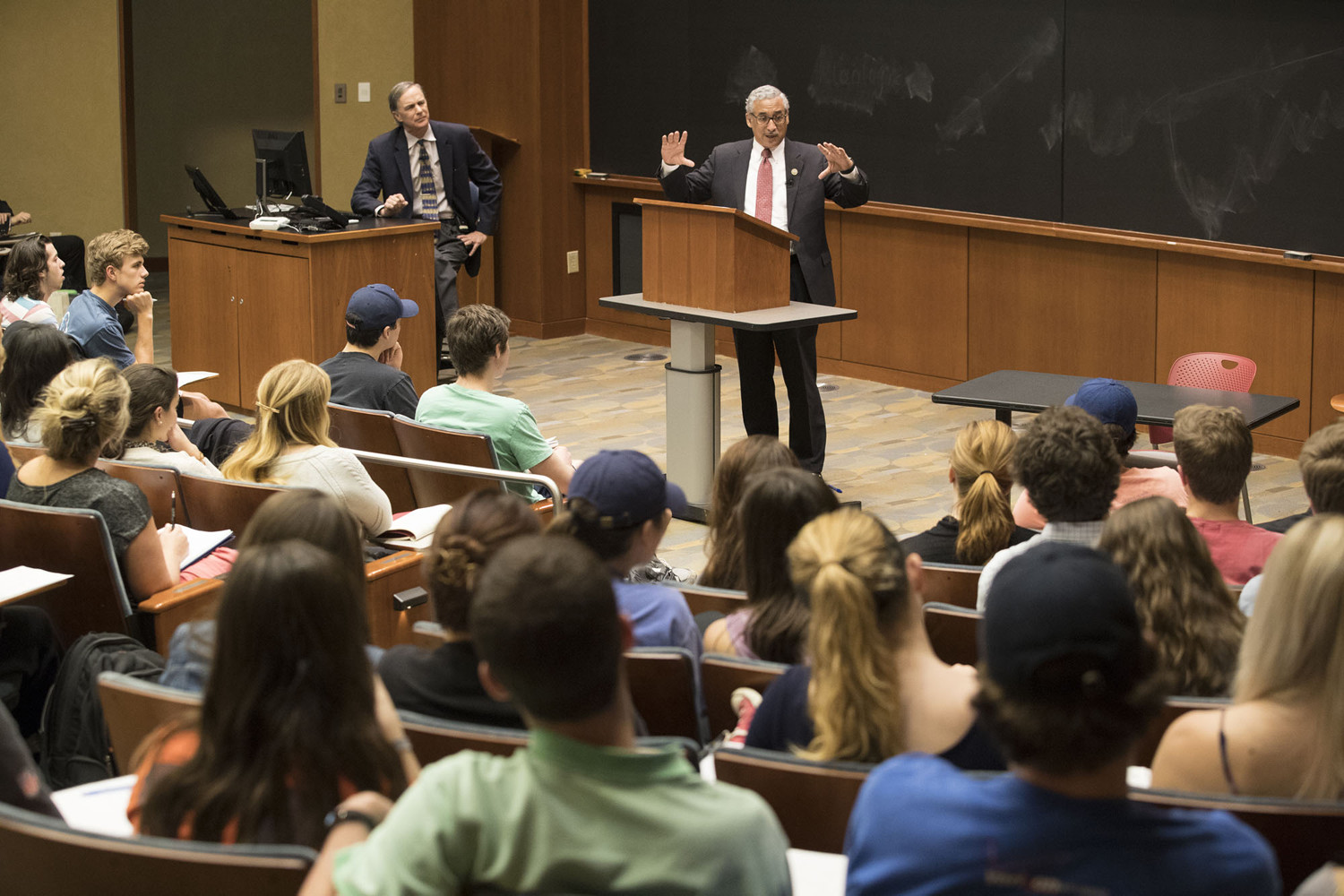The most senior member of Virginia’s congressional delegation, U.S. Rep. Robert C. “Bobby” Scott, addressed students at the University of Virginia on Monday, discussing how Congress can move forward in a time of paralyzing gridlock.
Scott, a Democrat, spoke to 250 undergraduate students in Gerald Warburg’s “Public Policy Challenges of the 21st Century” course, offered by UVA’s Frank Batten School of Leadership and Public Policy. Later in the semester, Warburg will host more leaders, including U.S. Rep. Tom Garrett, a Republican representing Virginia’s 5th District; U.S. Rep. Gerry Connolly, a Democrat representing Virginia’s 11th District; and former House Majority Leader Eric Cantor, who lost a Republican primary in 2014.
“As we discuss various policy issues, I want students to hear from political leaders who have been working to build consensus around policies and implement them,” Warburg said. “We ask the members of Congress not to come down and offer partisan talking points, but to specifically address areas where they believe a consensus can be achieved.”
Scott, who is serving his 13th term representing Virginia’s Third Congressional District, which covers much of Hampton Roads, told students that, though the atmosphere on Capitol Hill is “difficult” at the moment, there are opportunities to bridge partisan divides. In particular, he focused on criminal justice reform, an issue he has championed throughout his three decades of public service.

Scott discussed early intervention and education programs that he believes can reduce crime and lower costs.
Along with Republican co-sponsor Jim Sensenbrenner, Scott is preparing to reintroduce the Safe, Accountable, Fair and Effective Justice Act, which focuses on building up preventative programs, concentrating prison space on violent and career criminals and reinvesting cost savings in the community. Sensenbrenner and Scott originally introduced the SAFE bill in 2015, but were not able to garner enough votes. This time, he is optimistic that he can convince more representatives that early intervention and preventative measures are more effective in reducing both crime rates and costs.
“Getting young people on the right track and keeping them on the right track will reduce crime and save money,” Scott said, mentioning initiatives like early childhood education, college access programs and others designed to reduce youth violence, discourage gang membership and prevent recidivism.
He decried reliance on mandatory minimum sentences, which he said put too many non-violent, low-level offenders behind bars for too long, and encouraged students to focus on evidence-based research about the most effective methods of criminal justice reform.
“If we can get back to the evidence-based approach of reducing crime and saving money, we can do something about criminal justice reform,” he said.
After his talk, Scott fielded questions from students. Some asked him about prominent criminal justice issues in his district or their home districts, including gang violence and increasing abuse of opioids and prescription painkillers. Others were curious about his stance on issues that have been in the news since Trump took office, such as potential budget cuts to organizations like Planned Parenthood.
Scott is not the first national figure to visit Warburg’s class. In January, two senior officials on the National Intelligence Council traveled to UVA to brief students on their quadrennial Global Trends Report, released to coincide with Trump’s inauguration three days earlier. The report, titled “Global Trends: Paradox of Progress,” forecasts top challenges facing the United States and the world over the coming decades, including the impact of an increasingly global economy and rapid technological advances and future terrorism threats. The Batten School was one of just a few public policy schools nationwide to receive an in-person briefing.
For Warburg, both visits represented a valuable opportunity to give students a chance to talk face-to-face with top government officials who could give them a behind-the-scenes glimpse of the nation’s policymaking – insight that they can make use of not just in their classes, but in their careers.
“This class is focused on the future, on what the policy agenda will be for these students when they are in policymaking positions – some of them as soon as next year,” Warburg said. “I want to show students that even though the country is divided right now, there are issues that unite us and that we can legislate on.”
Warburg said that he is heartened by how many students have shown an interest in applying to the Batten School and pursuing public policy.
“We have seen an enormous increase in demand for public policy courses, which is heartening given the divisions in our electorate,” he said. “Our students are running toward the problem, which, as an American, I find very encouraging.”
Media Contact
Article Information
February 20, 2017
/content/congressman-bobby-scott-briefs-students-rare-area-bipartisan-opportunity

